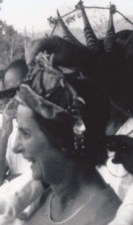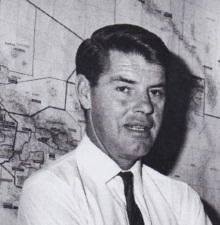

|
CARNE, Ronald Spencer (Ron) (12 May 2012) Ronald Spencer (Ron) CARNE (12 May 2012, aged 92) Ron and Joan were married in 1947, almost 65 years ago, and as they both had a strong desire to work in a developing country, Ron accepted a job as Agronomist with the Department of Agriculture, Stock and Fisheries (DASF) in the highlands of New Guinea. They moved there as soon as they were married. Ron and Joan's first home together was a log cabin made from locally sawn timber and a thatched grass roof on an Agriculture Experimental Station in a remote part of the highlands (Aiyura Valley) at 5,500 ft altitude. The only access to the valley was by small fabric-coated bi-plane (DeHavilland Dragon). There was only one other European couple there at the time, and they became lifelong friends (Aub & Ancie Schindler). So began 27 years of life and work in Papua New Guinea. A large part of that time was in Aiyura, but Ron had a role to play at other Agriculture centres in PNG at Mageri, Goroka, Rabaul, and Keravat during that time as well. The crop that absorbed the most time at Aiyura in the early years was 100 acres of Cinchona trees that were planted during the war. The bark of these trees was used to produce quinine, which was the main treatment for Malaria at the time. It was coffee, however, that became the crop that succeeded for the PNG agriculture industry. Different varieties were experimented with and Ron travelled to Africa and the West Indies in the late 40s to learn more about coffee and choose varieties that would suite the highlands of New Guinea. The Highlands of New Guinea now has a thriving coffee industry which makes up a large part of PNG's export industry, and earns more foreign exchange than any other industry. Most of it now is grown by small plots in the eastern highlands, sometimes only 20 trees, alongside subsistence farming. The work of Ron, along with others, contributed to this as they chose the varieties that suited best, and experimented with pruning methods, spacing and shading methods that produced the most coffee. Quite a bit of Ron's work in the 50s was to go out on patrol to remote villages and help them choose plots to start growing coffee, and providing the seed for it. After moving back to live in Australia in 1974, 27 years after arriving in New Guinea, Ron's working role changed to a more administrative job with the Soil Conservation Department. He and Joan adjusted back into suburban life in North Balwyn, Victoria. In 2005 Ron and Joan moved from their family home in North Balwyn where they had lived for 31 years. They had 6 years in Bedford Heights Retirement Village and certainly made the most of that time, and then the time came to adjusting to life in a Nursing Home. Ron made that change so bravely. He knew it was the right time and he settled in so well. Joan was able to join him there a few months later and they were able to spend the last 12 months of his life there together. He died peacefully there on 12 May 2012, surrounded by his family. Ron was a great family man and he and Joan had four children while they were at Aiyura. Joan returned to Melbourne to have Janet (Knight), but David, Hilary and Heather (Brooker) were born in Lae, Goroka and Kainantu respectively. Aiyura valley was a wonderful place to grow up in during the 50s and 60s. There are now 11 grandchildren and 14 great-grandchildren, ranging in age from 12 years to a few weeks of age. Ron had a wonderful life, so well-lived, and is a great inspiration to all of his friends and family. David Carne
Mais, as she was always known, was a Brisbane girl who became a nursing sister and met Barney Madden in Dalby where he was teaching. He went to PNG and was quickly promoted to be District Education Officer, Southern Highlands. They married at Christmas 1956 and she joined him at Mendi for a term before moving to Sohano when he took over Education in Bougainville. Barney was next made Principal of the Goroka Teachers College and then advanced to the same position at the Port Moresby College at Ward Strip. This was after the couple travelled to Missouri, USA, in 1967 so that Barney could complete a PhD degree in Sociology. In 1974 the family returned to Brisbane where Dr Madden took up a post at Mt Gravatt College of Advanced Education. He died in 1998 but Mais had the solace of her children Camilla and David, their spouses, and four grandchildren all living close by. Camilla and Bruce Montgomery Early in 1957 Mais was flown into Mendi, then a scatter of native material huts alongside the airstrip, with only two tin-roofed dwellings visible from the air these being the residences of the DC and the Medical Officer. On alighting from the Norseman she saw three women advancing towards her and a Landrover parked behind them. Mais told me that she thought "Oh good, these kind ladies are going to drive me to Mendi..." Little did she know that what she could see was it.... And since Barney had been none too explicit about the house prepared for his bride she was somewhat taken aback at the pitpit walls, plank floors, wood-burning stove and bucket suspended above the shower recess. However like so many unsuspecting women brought to the Territory before her she buckled down and made the best of it. Canasta nights by the light of a kerosene lamp at her house were always great entertainment. As was the vinyl LP record of My Fair Lady she brought back from leave which caused Mendi's miniscule expat population to flock to Haus Madden to listen to before departing singing "All I want is a room somewhere" or "Just you wait 'enry 'iggins...." Simple pleasures for an outstation. As a trained nurse Mais was able to assist Drs Lawrence Malcolm and Vlado Ivinskis from time to time. And when PO Ron Neville's wife had difficulty with delivering her second child Mais sat with Colleen all night before she could be flown to Goroka next day. She also assisted Trevor McMinn, the chalkie at the Mendi primary school. He had failed the Music component of his Teaching Certificate but was permitted to retake the test. I chanced on this humorous spectacle: Mais singing, Barney beating time and Trevor faking the identification of musical notes. Mais was a fine genuine singer but the other two had only one concern: that the local school should not lose the Head the children called Masta Micmac. So a Pass, no worries. I am sure Mais Madden was a well liked participant in the affairs of all her other PNG postings but she never forgot the people (characters?) at her first station. Have any of us? Addendum provided by Jim Toner Albert Lloyd HURRELL, CMG, OBE, MC (22 May 2012, aged 96)
In 1936 he graduated from Armidale Teachers College and commenced his short career as a teacher at Adaminaby and Bombala Schools. At the beginning of WW2, both Lloyd and Les enlisted from Rabaul and they became part of the 4th Reinforcements 2/31st Battalion. Captain Lloyd Hurrell served in the Middle East and New Guinea. He was awarded the Military Cross for his gallantry on the Kokoda Track. His brother Les was killed in action at Gona. Lloyd was injured badly and while recuperating in Australia met and married Margaret Crowther. Margaret became his partner in every adventure that they had in their long life together. At the end of the war Lloyd and Margaret returned to New Guinea where he resumed his occupation as a patrol officer. Initially he served in Salamaua, Morobe, Mumeng, Finschhafen and Bogia. In 1950 Lloyd was chosen to establish a new Patrol Post at Menyamya. He led a party of 13 native police and 157 carriers. Lloyd loved his time at Menyamya and always kept a close link with the people from there. In later years Lloyd employed many people from Menyamya on his coffee plantation. He was then transferred to Wau as Assistant District Officer. Lloyd did not enjoy this as much as he had the patrolling and decided to purchase land in Wau. He planted coffee and had cattle and poultry on the property called Kosali. In the early days he grew vegetables to supplement his income. Lloyd's younger brother, Frank, joined him to live in Wau. He purchased a dairy and went on to own many other businesses in Wau. The brothers were very close and their children had an idealistic time growing up in Wau. Lloyd began to look at the broader picture in New Guinea. He became influential in the Highland farmers and Settlers Association and in 1960 was elected as member for New Guinea Coastal in the Legislative Council. He served until 1963 and was Deputy Chairman of the Select Committee for Political Development in 1962, which laid the framework for eventual self-government and independence. He also held the position of State President for the RSL in 1967 and 1968 as well as holding office in his own Sub Branch in Wau. Lloyd was appointed Chairman of the Coffee Marketing Board in 1965 and held that position until 1979 when he sold Kosali plantation to the local people. During his time in the Coffee Marketing Board he worked hard to ensure the future of coffee growers in Papua New Guinea. He moved to Lae where he was a director of SP brewery. Lloyd became a citizen of PNG. Lloyd was awarded an OBE in June 1969 for public and community service and in 1980 was created a Companion of the Most Distinguished Order of S Michael and St George for distinguished service to he coffee industry. The Coffee Industry Board Room is officially named the "A L Hurrell Board Room" and his photograph still watches over the decisions being made about the coffee industry. In 1982 Lloyd and Margaret moved to Australia although their hearts have always remained in Papua New Guinea. Margaret survives Lloyd and lives at Tweed Heads. Four of Lloyd's five children were born in Papua New Guinea and still have strong ties to the country. Lloyd Hurrell had an amazing life and he was an extraordinary man who will be missed. Sue Spargo
The family spent 15 years in PNG before returning to live in the hamlet of Mt Nebo outside Brisbane. The following 18 years spent at their mountain home, Lissanoure, are remembered well by the many visitors who enjoyed the warm, generous Macartney hospitality there. Betty continued to work in medical science with a team at the Royal Children's Hospital researching Cystic Fibrosis. John died of lung cancer in 1992 and Betty moved to Brisbane. Later she spent time travelling between her home at Forest Place, Durack and Northern Rivers, NSW, sharing life with Robin McKay who they had met in Bougainville. Robin died in 2010 and Betty moved permanently to Durack. Betty's abiding passions were her family and friends, and creating a garden and home wherever she found herself: from Bougainville to Brisbane and all points in between. As well as her professional skills, she was a great correspondent, a keen reader and writer, and enthusiastic fisherwoman. Betty died peacefully in her sleep on 9 September 2011. She is survived by her brother Dr Thomson Leckie and daughter, Belinda Macartney. The following eulogy was given at Betty’s funeral by PNG colleague Professor Robin Cooke. I first met Betty in January 1962. She had been working in the Biochemistry section of the pathology laboratory in Port Moresby for the previous 18 months. The laboratory was barely recognisable as one, and her section was the only one that was functioning at all. In that January, reinforcements arrived in the shape of two UK scientists who both had significant expertise and experience in working in Africa. Although I was the youngest and least experienced in this team, I was appointed as the head by Director of Public Health, Roy Scragg, with a brief to "fix" the laboratory in Port Moresby, then to establish a pathology service throughout the country. The others took this with a good grace, Betty with her trademark cheerful optimism. Betty and John had spent their first term in Bougainville and they had enjoyed this very much with Betty taking on the role of teacher for Belinda who was enrolled in Distance Education for her first years of schooling. Then John was appointed to a position in Port Moresby and Betty got a job in the pathology laboratory; she had some training as a laboratory technician at the Brisbane General Hospital before her marriage. Her time in Bougainville had given her experience in how to live and work with the people and the Administration of PNG. She was a willing teacher and confidante and I followed her example. We all forged very strong friendships with the PNG men and women who were working in the laboratory and many of these friendships endured over the next 40 years. Wasi Basinaro was a talented and vivacious young woman who had been overseas to do some technician training before she started work in the lab. She became Betty's right hand person and a long term friend. Some years ago I was awarded an OBE by the Government of PNG for services to medicine in that country. I happened to be the figurehead of the team that did the work and Betty was an important member of that team. Robin Cooke
Brian resided in PNG from 1950 to 1961. He was Private Secretary to Sir Donald Cleland, KBE; Principal of the Administrative College (forerunner of UPNG); author of Papua New Guinea—A Contemporary Survey (the original manuscript and working papers are held in the Australian National Library); and the architect behind the establishment of an auxiliary division for the PNG people in the Public Service of TPNG. Brian's happiest years were spent in NG with many amazing experiences flying over the inland in the early planes. Joan Ayre
A Randwick boy, he took his newly acquired Law degree to Townsville but, as he put it, found the place "too provincial". So he moved on to that scene of unceasing excitement and intellectual stimulation, Port Moresby, to spend much of his life there. Cecil worked for the Public Solicitor, the Administrative College, and latterly the Law Faculty of UPNG between occasional excursions for jobs in London and Darwin. In Moresby he also served in the uniform of the RAN Reserve in its legal division. Cec had a ready wit and was an accomplished "stirrer". No anecdotes needed: all those who knew him will have their own. He leaves behind a cousin and many friends. Jim Toner
PNG history goes back a long way for Alison with her father, William John Lambden, MC, being accepted as a Patrol Officer by the Papuan Government in 1921. In 1923 he married her mother, Lillian Kate, in Port Moresby. Alison was born in the Port Moresby hospital on 20 September 1925 and spent most of her childhood days and schooling in Papua. At the onset of World War 2, with her eight year old brother, Graham, she evacuated to Australia and upon turning eighteen in September 1943, she proudly joined the AAMWS (the Australian Army Medical Women’s Service). At the war's end in August 1945, because of her father's failing health, Alison was granted a discharge from the Service and with her mother was amongst the first civilian women to return to post-war Papua. She joined her father who, after serving with ANGAU during the war years, was now the District Officer with the Provisional Administration in Samarai. After her father's death in January 1947, Alison and Mrs Lambden transferred to live in Port Moresby and were employed by the Provisional Administration at Konedobu HQ . Alison met Patrol Officer David Marsh andthey married on 19 May 1951. With passing time, as the wife of District Commissioner David Marsh, OBE, Alison fulfilled her duties as a gracious hostess, entertaining constantly with style and flair to cater for functions for the stream of official guests and dignitaries. Alison was also involved in a wide variety of charities and projects: her main loves were the Inner Wheel and the Country Women's Association, of which she was a PNG Branch President for many years. In 1972, she was awarded for her services to the Northern District with a "Companion Otohu" to compliment David's "Otohu". This is the highest award to be given by the Orokaiva people and she was extremely proud and honoured. Another proud honour bestowed upon her was the award, by the Governor General of Papua New Guinea, of a Certificate of Appreciation for her services to Papua New Guinea. On moving back to Port Moresby, Alison was involved with the Royal Tour and the Papua New Guinea Independence Celebrations in 1975. Retiring to Australia after Independence was a huge change in life style for Alison. She continued her civic interests and kept in touch with her friends and travelled, including a Pacific Island cruise with her daughter Jillian and family that included a visit to her beloved Samarai. She dearly loved her daughters, Jillian, Susan and Diane and their families. In the latter months, Jill was her constant companion tending to her Mother's care and was with her at the very end. Alison Marsh, born in Port Moresby, grew up in the "territory", married there and, after fifty years, retired to Australia. In her mind, Papua New Guinea was 'home" and she was proud of her Papuan origin. Alison, a special friend, Bamahuta. Nancy Johnston
A remarkable PNG pioneer, planter and politician, he was known universally as "Markham Tom" for his bonds to the soil and people of the Markham Valley in the Morobe district. He was the first European farmer to settle those vast savannah plains soon after arriving from Queensland as a 17-year-old in 1947. He planted cocoa, copra, rice, sorghum and peanuts and grew cattle on his Maralumie farm and soon became inextricably linked to the people of his new land and home. He was elected to the first local government council in his area—Huon Gulf—and his 15 years of service gave him a broad understanding and connection that would shape his life and affect many. Tom Leahy represented Markham in the House of Assembly (of the newly-united PNG) from 1968-72 and his contemporaries included two young men who would play a huge part in the history of their country, Michael Somare and John Guise. Leahy became leader of government business ensuring passage of bills through parliament and a member of the Constitutional Planning Committee. In 2000, the 25th anniversary of independence, the PNG government honoured him with a citation commending him for his contribution to the country and its people. Tom Leahy was part of a family "dynasty" whose surname became synonymous with PNG history since the 1930s after four uncles migrated from Queensland to New Guinea in the interwar years. (His Uncle Mick Leahy was immortalized in the documentary First Contact.) He was intensely proud of his clan. But Tom Leahy’s achievements were distinct and unique: he was the ultimate individual. The big-hearted Irish-Australian, who would passionately add PNG to his DNA, was a beloved character who loved characters. He was both plain speaking and well-spoken, a widely-read raconteur who could turn a riotously funny yarn into a lesson in philosophy. He was fierce in spirit and gentle in nature. Perhaps that nature was best demonstrated by the mutual respect between him the people with whom he spent so much of his life: the Markhams, the folk of Erap, Chivasing and Gabsonki, the tribesmen of the Wains and Wantoats who also worked Maralumie and the broader communities of PNG he represented. His immaculate tok pisin gave him even more currency, as did his curiosity and respect for their customs, traditions and lore. He was intrigued with the spirit world and the politics of PNG and these would dominate two fascinating books he later penned, including, of course, Markham Tom. Many words will be written and tales exchanged about Tom Leahy long after family and friends gather to farewell him. But for the moment these lines from his friend Kitty Ginter in her foreword to his second book Tamburan, Others and me gives a flavour:
Tom is survived by his children Peter, Ann and Neil and grandchildren. Max Uechtritz
|
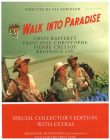
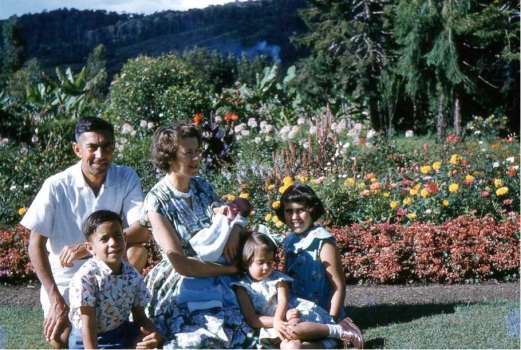 While Ron was working in New Guinea, he and Joan had a close association with the Wycliffe Bible translators, who set up their PNG headquarters at Ukarumpa, across the river in Aiyura Valley. Many of the members there became great friends of Ron and Joan, and the centre there at Ukarumpa became a focus for the Carne family's social and spiritual life. SIL wished to let Ron and Joan know how much they were honored and loved by the team there in PNG. They decided to make them Honorary Members of the organization. Such an honor is not normally given actually, but in one special way they made the statement that all the members felt for them. Ron spent quite a bit of time in his retirement in Melbourne, helping out at the Kangaroo Ground Australian Headquarters for SIL, working in the gardens and mowing the lawns.
While Ron was working in New Guinea, he and Joan had a close association with the Wycliffe Bible translators, who set up their PNG headquarters at Ukarumpa, across the river in Aiyura Valley. Many of the members there became great friends of Ron and Joan, and the centre there at Ukarumpa became a focus for the Carne family's social and spiritual life. SIL wished to let Ron and Joan know how much they were honored and loved by the team there in PNG. They decided to make them Honorary Members of the organization. Such an honor is not normally given actually, but in one special way they made the statement that all the members felt for them. Ron spent quite a bit of time in his retirement in Melbourne, helping out at the Kangaroo Ground Australian Headquarters for SIL, working in the gardens and mowing the lawns.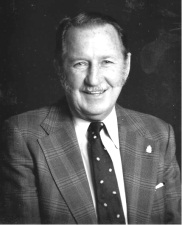 Lloyd Hurrell was born on 20 November 1916 at Wingham, NSW; he had three brothers, Les, Dick and Frank. He graduated from Hurlstone Agricultural High School where he was awarded the McKern Scholarship for all round ability, character and leadership. He was a good scholar and a fine athlete; representing the school in rugby league, cricket, swimming and boxing.
Lloyd Hurrell was born on 20 November 1916 at Wingham, NSW; he had three brothers, Les, Dick and Frank. He graduated from Hurlstone Agricultural High School where he was awarded the McKern Scholarship for all round ability, character and leadership. He was a good scholar and a fine athlete; representing the school in rugby league, cricket, swimming and boxing.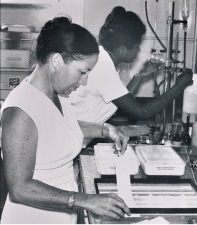 Betty was born in Ingham, North Queensland, in 1927 where her father was a GP. Her mother was a trained theatre sister. During WW2, along with her sister and brother, Betty was sent to boarding school at NEGS in Armidale, New England, NSW. Betty was an earnest student and finished as Dux of the school. She was also good at sport. She then went to Queensland University to study science and worked in the pathology laboratory at the Brisbane General Hospital. She met her future husband, John Macartney from Longreach, Queensland, while they were both studying and they married in 1950. Their first child, Belinda, was born in 1952. Son Paul was born in 1955 (he died in a motor bike accident aged 25).
Betty was born in Ingham, North Queensland, in 1927 where her father was a GP. Her mother was a trained theatre sister. During WW2, along with her sister and brother, Betty was sent to boarding school at NEGS in Armidale, New England, NSW. Betty was an earnest student and finished as Dux of the school. She was also good at sport. She then went to Queensland University to study science and worked in the pathology laboratory at the Brisbane General Hospital. She met her future husband, John Macartney from Longreach, Queensland, while they were both studying and they married in 1950. Their first child, Belinda, was born in 1952. Son Paul was born in 1955 (he died in a motor bike accident aged 25).